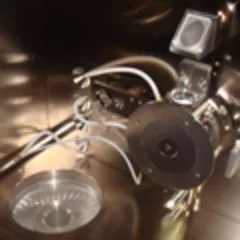Achieving more together - under this motto fourteen chairs and departments managed to acquire two state of the art instruments for life science research. On the initiative of Prof. Bernhard Küster of the Chair of Bioanalytics two departments of the Center of Life and Food Sciences Weihenstephan (WZW) and the University Hospital Rechts der Isar (MRI) merged: They acquired - financially supported by the TU München and the German Research Foundation (DFG) - two high performance mass spectrometers for about 800,000 Euros which all parties have access to now. "With these devices crucial new research approaches in life sciences and medicine are enabled," said Küster.
The basis of this interdisciplinary initiative is proteomics, a research area that explores all proteins in a cell. Proteins are the basic modules of life. Researchers call the complete protein inventory in a living cell the proteome. What makes it exciting for life scientists: The proteome is dynamic; it changes in terms of its qualitative and quantitative composition in the course of its cell life. With the new, highly sensitive MALDI and ESI mass spectrometers researchers can explore those changes. Because the procedures "Matrix-assisted laser desorption/ionization" (MALDI) and "electrospray ionization" (ESI), which have been awarded the Nobel Prize in 2002, analyze the proteins without destroying them.
Several research projects at the TUM profit from these effective and gentle protein analytics: Thus for example Prof. Roland Schmid's team at the MRI can gain new insights into the development of malignant pancreatic cancer. The nutrition scientists headed by Prof. Dirk Haller at the Nutrition and Food Research Center can improve their research on chronic intestinal inflammation with this method: In the future only few inflamed cells will be enough to generate loads of valuable data since the new analytical devices increase the protein identification rate from the current 60 to over 90 percent.
Decisive impulses by the new devices are also expected by the researchers at the Chair of Bioanalytics: By exploring the spectra of activity of already approved cancer drugs they point ways to new therapeutic applications. Moreover, the two mass spectrometers analyze proteins more quickly than older devices: This benefits not only the members of the consortium with large numbers of samples, such as the Chair for Food Process Engineering and Dairy Technology which explores optimization processes for the dairy industry, but all involved departments.
The access to the newest technology for protein analysis has been enormously improved by the newly purchased high-tech equipment. "But we want to continue expanding", says the initiator Prof. Bernhard Küster. He only regards the merger of the 14 departments as a seed crystal of a larger technology center for proteomics at the TU München.
